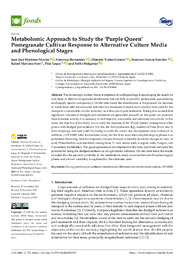Título :
Metabolomic Approach to Study the ‘Purple Queen’ Pomegranate Cultivar Response to Alternative Culture Media and Phenological Stages |
Autor :
Martinez Nicolas, Juan Jose 
Hernández, Francisca
Núñez-Gómez, Dámaris 
Garcia-Sanchez, Francisco 
Martínez Font, Rafael
Legua, Pilar 
Melgarejo Moreno, Pablo  |
Editor :
MDPI |
Departamento:
Departamentos de la UMH::Producción Vegetal y Microbiología |
Fecha de publicación:
2023-01-11 |
URI :
https://hdl.handle.net/11000/32369 |
Resumen :
The increasingly evident threat of depletion of world peat bogs is encouraging the search for and study of alternative agricultural substrates that can fully or partially replace peat, guaranteeing food supply (quality and quantity). On the other hand, the identification of the potential for the reuse of waste from relevant economic activities has increased in recent years, mainly motivated by the change to a sustainable circular economy, as is the case of port sediments. Taking into account that significant volumes of dredged port sediments are generated annually so that ports can maintain their economic activity, it is necessary to find objective, sustainable and safe reuse alternatives. In this sense, the objective of this study was to study the response of the “Purple Queen” pomegranate when grown with dredged port sediment. For this, the fruit production (kg), number of fruits (fruits tree-1), fruit weight (g), and seed yield (%) aiming to verify the correct tree development were evaluated. In addition, a 1H-NMR foliar metabolomic study for the three most relevant phenological phases was performed (flowering, fruit development, and post-harvest) to identify metabolic changes in trees. In total, 29 metabolites were identified; among them, 11 were amino acids, 6 organic acids, 5 sugars, and 7 secondary metabolites. The good agronomical development of the trees and fruits indicated the potential for using the dredged sediment as an agricultural substrate. On the other hand, the results revealed that the greatest variability in the metabolomic study occurred between the phenological phases and a lower variability is explained by the substrates used
|
Palabras clave/Materias:
Punica granatum
Port sediment
Metabolomic differentiation
Multivariate analysis
1H-NMR |
Área de conocimiento :
CDU: Ciencias aplicadas: Agricultura. Silvicultura. Zootecnia. Caza. Pesca |
Tipo de documento :
info:eu-repo/semantics/article |
Derechos de acceso:
info:eu-repo/semantics/openAccess |
DOI :
https://doi.org/10.3390/foods12020352 |
Publicado en:
Foods 2023, 12(2), 352 |
Aparece en las colecciones:
Artículos - Producción vegetal y microbiología
|

 La licencia se describe como: Atribución-NonComercial-NoDerivada 4.0 Internacional.
La licencia se describe como: Atribución-NonComercial-NoDerivada 4.0 Internacional.
.png)